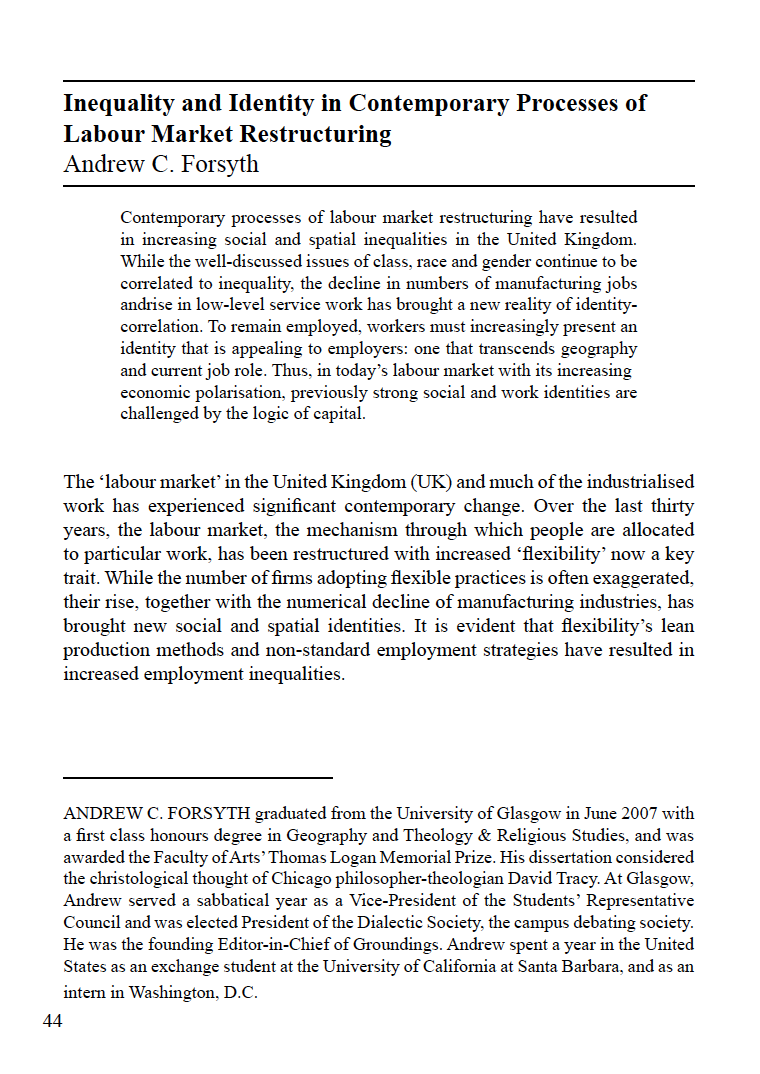Inequality and Identity in Contemporary Processes of Labour Market Restructuring
DOI:
https://doi.org/10.36399/GroundingsUG.1.274Keywords:
Market Restructuring, Inequality, Gender, Class, Trade Unions, United Kingdom, Flexibility, Spatial Inequality, Economic PolicyAbstract
Contemporary processes of labour market restructuring have resulted in increasing social and spatial inequalities in the United Kingdom. While the well-discussed issues of class, race and gender continue to be correlated to inequality, the decline in numbers of manufacturing jobs and rise in low-level service work has brought a new reality of identity-correlation. To remain employed, workers must increasingly present an identity that is appealing to employers: one that transcends geography and current job role. Thus, in today’s labour market with its increasing economic polarisation, previously strong social and work identities are challenged by the logic of capital.
References
Atkinson, John. “Flexibility, Uncertainty and Manpower Management.” IMSReport No.89. Brighton, UK: Institute of Manpower Studies, 1984.
Beder, Sharon. Selling the Work Ethic: From Puritan Pulpit to Corporate PR. London: Zed Books, 2000.
Blau, Joel. Illusions of Prosperity: America’s Working Families in an Age of Economic Insecurity. Oxford: Oxford University Press, 1999.
Bradley, Harriet, Mark Erickson, Carol Stephenson and Steve Williams. Mythsat Work. Cambridge, UK: Polity, 2000.
Castree, Noel, Neil Coe, Kevin G.Ward and Michael Samers. Spaces of Work: Global Capitalism and Geographies of Labour. London: Sage, 2004.
Finkelstein, Marvin. Net-Works: Workplace Change in the Global Economy.Oxford: Rowman and Littlefield, 2004.
Giddens, Anthony. The Constitution of Society: Outline of the Theory of Structuration. Cambridge: Polity Press, 1984.
Glasgow Media Group. Available from http://www.gla.ac.uk/centres/mediagroup/publications.htm. Internet; accessed 4 July 2007.
Gupta, Suman. “Information Services Outsourcing and Migrational Anxieties.”Available from http://www.open.ac.uk/Arts/ferguson-centre/archive/ roehampton-conf-abstracts-july2004/RCAsuman21.htminternet.Internet; accessed 4 July 2007.
Massey, Doreen. “A Global Sense of Place.” Marxism Today 35 (1991): 24-29.
McDowell, Linda. “Father and Ford Revisited: Gender, Class and EmploymentChange in the New Millennium.” Transaction of the Institute ofBritish Geographers 26 (2001): 448-464.
McDowell, Linda. “Masculinity, Identity and Labour Market Change.” Geografiska Annaler 86 B 1 (2004): 45-56
McDowell, Linda. and Joanne Sharp. A Feminist Glossary of Human Geography. London: Arnold, 1999.
Peck, Jamie. Work-Place: the Social Regulation of Labor Markets. New York & London: Guilford, 1996.
Phillips, Tim. “Imaginary Communities and Self-Identity: An Exploratory Quantitative Analysis.” Sociology 36 (3) (2002): 597-617.
Quinlan, Michael. “The Implications of Labour Market Restructuring in Industrialized Societies for Occupational Health and Safety.” Economic and Industrial Democracy 20(3) (1999): 427-460.
Rutherford, Tod. “Requiem or Rebirth? Internal Labour Markets and Labour Market Restructuring in the Kitchener and Saint Ste. Marie Regions.” The Canadian Geographer/Le Géographe canadien 50:2 (2006): 197-216.
Silver, Susan, John Shields and Sue Wilson. “Restructuring of Full-Time Workers: A Case of Transitional Dislocation or Social Exclusion in Canada? Lessons from the 1990s.” Social Policy and Administration 39:7 (2005): 786-801.
Watt, Paul. “Urban Marginality and Labour Market Restructuring: Local Authority Tenants and Employment in an Inner London Borough.” Urban Studies 40:9 (2003): 1769-1789.

Downloads
Published
Issue
Section
License
Copyright (c) 2007 Andrew C. Forsyth

This work is licensed under a Creative Commons Attribution 4.0 International License.
The CC BY 4.0 license is a Creative Commons license. This is a non-copyleft free license that is good for art and entertainment works, and educational works. It is compatible with all versions of the GNU GPL; however, like all CC licenses, it should not be used on software. People are free to: Share — copy and redistribute the material in any medium or format; Adapt — remix, transform, and build upon the material for any purpose, even commercially. The licensor cannot revoke these freedoms as long as you follow the license terms. But they must conform to the following terms: Attribution — You must give appropriate credit, provide a link to the license, and indicate if changes were made. You may do so in any reasonable manner, but not in any way that suggests the licensor endorses you or your use. No additional restrictions — You may not apply legal terms or technological measures that legally restrict others from doing anything the license permits.
Please check individual article PDF copies to see if any additional restrictions apply.







